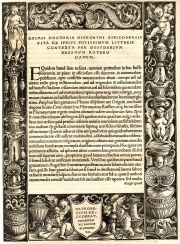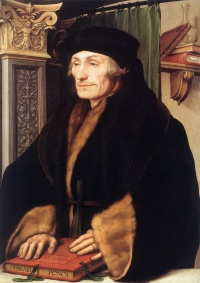Desiderius Erasmus
From Textus Receptus
Desiderius Erasmus Roterodamus (sometimes known as Desiderius Erasmus of Rotterdam) (October 27, 1466/1469, Rotterdam – July 12, 1536 Basel) was a Dutch Renaissance humanist and Catholic Christian theologian. His scholarly name Desiderius Erasmus Roterodamus comprises the following three elements: the Latin noun desiderium ("longing" or "desire"; the name being a genuine Late Latin name); the Greek adjective ἐράσμιος (erásmios) meaning "desired", and, in the form Erasmus, also the name of a saint; and the Latinized adjectival form for the city of Rotterdam (Roterodamus = "of Rotterdam").
Contents |
Youth
At a young age Erasmus's parents died of the plague which resulted in him being sent to a monastery along with his brother. Erasmus was a very intelligent boy and he chose to be an Augustinian because they had the best library at that time. His behavior was not typical of those in the Augustinian order. Though he was ordained, he chose never to really function as a priest.
Erasmus was a classical scholar who wrote in a "pure" Latin style and enjoyed the sobriquet "Prince of the Humanists." He has been called "the crowning glory of the Christian humanists." Using humanist techniques for working on texts, he prepared important new Latin and Greek editions of the New Testament. These raised questions that would be influential in the Protestant Reformation and Catholic Counter-Reformation. He also wrote The Praise of Folly, Handbook of a Christian Knight, On Civility in Children, Copia: Foundations of the Abundant Style, Julius Exclusus, and many other works.
Erasmus lived through the Reformation period and he consistently criticized some contemporary popular Christian beliefs. In relation to clerical abuses in the Church, Erasmus remained committed to reforming the Church from within. He also held to doctrines such as that of free will, which Protestant Reformers rejected in favor of the doctrine of predestination. His middle road disappointed and even angered many Protestants, such as Martin Luther, as well as conservative Catholics. He died in Basel in 1536 and was buried in the formerly Catholic cathedral there, recently converted to a Reformed church.
Biblical Greek studies
Erasmus was surrounded with Bible manuscripts from his childhood in the 1460s, until the publication of his Greek Text in 1516. This is over 40 years! He worked for a dozen years on the text itself. “The preparation had taken years” (Durant, p. 283).
As early as 1505, Erasmus wrote to a friend, “I shall sit down to Holy Scripture with my whole heart, and devote the rest of my life to it...[A]ll these three years I have been working entirely at Greek, and have not been playing with it” (Froude, The Life and Letters, p. 87).
He began working directly on the text much before 1507. Froude wrote that years before the text appeared, it was being prepared. “He had been at work over the Greek MSS. for many years. The work was approaching completion” (Froude, The Life and Letters, p. 93).
Frederick Nolan, writing in 1815, states, In addition to the manuscripts which Erasmus owned or had seen himself, he gathered readings from the whole of Europe through his broad friendships. He noted, “I have a room full of letters from men of learning...” “[W]e find by the dates of his letters that he was corresponding at length and elaborately with the learned men of his time on technical points of scholarship, Biblical criticism...” (Froude, The Life and Letters, pp. 377, 394).
While Erasmus was in Italy he spent all of his time “devouring the libraries,” states Durant. “[C]omparing two codices...for the more correct reading of some intricate passage” was his passion (Durant, p. 275; Mangan, pp. 275, 91). Erasmus states, “It may easily be guessed how large a part of the usefulness of my work would have been lacking if my learned friends had not supplied me with manuscripts” (Mangan, p. 241).
When he went to Basel to work on the printing of this Greek New Testament, he arrived “weighed down with books...and copious notes on the New Testament” (Rummel, Erika, Erasmus s Annotations on the New Testament, Toronto: University of Toronto Press, 1986, p. 23).
In fact, Erasmus’ own manuscript collection was so large and valuable, it was covetously seized by customs when he left England to go to the Continent to finalize the Greek New Testament in 1514. He protested saying that “they had stolen the labours of his life.” The manuscripts were returned in a few days (Froude, The Life and Letters, p. 169).
Manuscripts Consulted

Critics often assert that ‘Erasmus did not have the manuscripts we have today.’ In fact, he had access to every reading currently extant, and rejected those matching the Catholic Vulgate (and the TNIV, NIV ESV, HCSB, and NASB today).
“It is indisputable that he was acquainted with every variety which is known to us; having distributed them into two principal classes, one of which corresponds with the Complutensian edition, the other with the Vatican manuscript...” “ERASMUS...published an edition, which corresponds with the text which has been since discovered to prevail in the great body of Greek manuscripts” ( Nolan, pp. 413, 419).
Kenneth W. Clark, the scholar who has examined more Greek manuscripts than most, admits, “WE SHOULD NOT attribute to Erasmus the creation of a ‘received text,’ but only the transmission from a manuscript text, already commonly received, to a printed form, in which this text would continue to prevail for three centuries” (The Gentile Bias and Other Essays, The Erasmian Notes on Codex 2, Leiden: E.J. Brill, 1980, p. 168.)
Erasmus claimed in the preface to have consulted the oldest and best manuscripts... (Hotchkiss, Valerie and Price, David, The Reformation of the Bible & The Bible of the Reformation, New Haven: Yale University Press, 1996, p. 100). He said his text was “solidly based” (de Jonge, Henk J., $Novum Testamentum a Nobis Versum: The Essence of Erasmus Edition of the New Testament,# Journal of Theological Studies 35, October 1984, p. 400). Erasmus suggested that he had consulted many manuscripts (Cambridge History of the Bible, vol. III, p. 60).
Erasmus further verified his Greek New Testament with scripture quotations seen in the writings of early Christian writers. His Greek text is so perfect, because he spent the first fifteen years of his studies almost wholly given to translating the early Christian writers of the first few centuries after Christ. In these writings from the 2nd, 3rd, and 4th centuries, one finds evidence for the Bible's oldest readings. They usually predate, by several hundred years, the Vaticanus and Sinaiticus MSS, from which modern translations get their readings. Froben published Erasmus' work on the ‘Fathers,’ as a series which included, Cyprian, Irenaeus, Chrysostom, Basil, Ambrose and numerous others. Being a theologian, Erasmus knew the origin of heretical omissions. “[I]n many places the virus still lurked of...Marcion,” he noted (Bainton, p. 264).
A humanist and Catholic?
The Old English dictionary says under "Humanist" - 'a classical scholar; esp. Latinist, a professor or teacher of Latin.'
In an attempt to belittle Erasmus some have decalired that Erasmus was a humanist. For example, James Boice, who was once head of the International Council on Biblical Inerrancy, writs about how those who prefer the Textus Receptus and the King James Version are out of touch:
- "However, in doing that [defending the Textus Receptus], they overlook the fact that Erasmus, who produced the Greek text on which the King James Bible is based, was actually a humanist" (Letter to Tom Hale, September 13, 1985).
Bob Jones, in his book The Truth About the King James Version Controversy, made the the same accusations towards Erasmus:
- "The Textus Receptus began with an edition of the Greek New Testament put together by a Roman Catholic humanist, Desiderius Erasmus, in A.D. 1516" (page 10).
A Humanist by today’s definition is one who is an atheistic evolutionist, somthing Erasmus would be totally opposed to. These people need to be clearer when speaking about historical figures as most hearers will assume that Erasmus was a secular humanist.
1 John 5:7
See Also 1 John 5:7 Comma Johanneum
Many arguments about Erasmus and the Comma Johanneum are out of date. Bruce Metzger (the founder of textual criticism) was largely responsible for the stories of Erasmus being forced to include the Comma in the Textus Receptus stream. Yet in the 3rd and for 4th editions of Metzger's book "The Text of the New Testament" he retracted those statements. Metzger based his retraction on the work of H.J. de Jonge, the Dean of the Faculty of Theology at Rijksuniversiteit (Leiden, Netherlands) and a recognised world authority on Eramus.
The conclusions in de Jonge’s writtings are as follows:
- (1) The current view that Erasmus promised to insert the Comma Johanneum if it could be shown to him in a single Greek manuscript, has no foundation in Erasmus' works Consequently it is highly improbable that he included the disputed passage because he considered himself bound by any such promise.
- (2) It cannot be shown from Erasmus' works that he suspected the Codex Britannicus (Miniscule 61) of being written with a view to force him to include the Comma Johanneum.
Metzger justifies his retraction on the basis of advances in research in the last quarter of a century. Along side this new research is further strengthening of the validity of the Majority Text manuscripts and Textus Receptus mainly because of less disruption in the “transmission history” of the Byzantine Texts.
See Also
External Links
- Erasmus Who He Was & Why is he important today? By Jim Searcy
- Erasmus of Rotterdam - A Good Son of the Roman Catholic Church? Article by Dr. Gary E. LaMore of the Dean Burgon Society.
- All Works by Erasmus at Erasmus Online
- Works by Erasmus at Internet Archive
- Little known facts about Erasmus and the Scriptures
- Myths about the King James Bible - Erasmus was a Humanist By David Cloud

